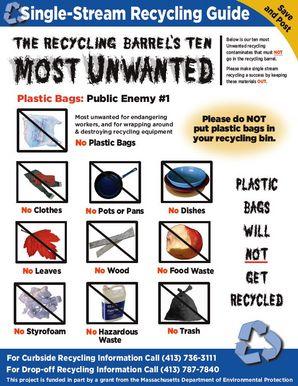Massachusetts is confronting escalating challenges in recycling and waste management as municipalities grapple with stricter regulations, rising costs, and shifting consumer behaviors. With recycling markets fluctuating and landfill capacities increasingly strained, state officials and local authorities are seeking innovative solutions to manage the growing volume of waste while meeting ambitious environmental goals. This article explores the current landscape of waste management in Massachusetts, highlighting the obstacles faced and the strategies being employed to address them.
Table of Contents
- Massachusetts Struggles with Rising Waste Volumes and Limited Disposal Space
- The Impact of Recycling Program Cuts on Local Communities and the Environment
- Innovations and Technologies Offering Hope for Sustainable Waste Management
- Policy Changes and Community Initiatives Critical to Reversing Recycling Decline
- In Summary
Massachusetts Struggles with Rising Waste Volumes and Limited Disposal Space
Massachusetts is grappling with an escalating waste crisis as the volume of municipal solid waste continues to surge, putting intense pressure on the state’s already constrained disposal infrastructure. Landfills are rapidly approaching capacity, while existing facilities face strict regulatory limits and community opposition, leaving few viable options to accommodate the growing stream of refuse. This shortage of disposal space has ignited concerns among environmental experts and local officials, who warn that without immediate and innovative solutions, the state risks facing significant environmental and public health risks.
Key challenges compounding the issue include:
- Rising consumer waste generated by increased population density and consumption patterns.
- Limited landfill expansion opportunities due to geographic and regulatory constraints.
- Insufficient investment in alternative disposal technologies such as waste-to-energy facilities and composting programs.
- Complex recycling market dynamics that hamper efforts to divert waste streams effectively.
These factors collectively underscore the urgent need for Massachusetts to reassess its waste management strategies and prioritize sustainable practices to curb the growing waste dilemma.
The Impact of Recycling Program Cuts on Local Communities and the Environment
Recent reductions in recycling funding have sent ripples through numerous Massachusetts communities, straining local resources and jeopardizing sustainability goals. Municipalities are forced to scale back collection services, leading to increased household waste and a surge in landfill volumes. Residents have expressed frustration over limited access to recycling centers and shortened pickup schedules, which complicate efforts to divert waste from landfills. This shift not only hampers community engagement in environmental stewardship but also undermines the social fabric built around collective responsibility for waste reduction.
The environmental consequences are equally alarming:
- Increased greenhouse gas emissions from expanded landfill usage, contributing to climate change worries.
- Higher contamination rates in recyclable materials due to less frequent pickups and reduced public education efforts.
- Greater depletion of natural resources as reusable materials are lost to waste streams instead of being reintegrated.
- Escalation in pollution levels impacting local ecosystems and public health, especially around waste disposal sites.
Without immediate intervention, these setbacks could erode progress made in regional waste management initiatives, urging policymakers to reconsider the long-term costs of cutting recycling program budgets.
Innovations and Technologies Offering Hope for Sustainable Waste Management
Massachusetts is witnessing a surge in cutting-edge solutions that could reshape its waste management landscape. Advanced automated sorting systems powered by artificial intelligence are enhancing the accuracy and efficiency of recycling processes, reducing contamination rates and ensuring more materials are effectively diverted from landfills. Additionally, biodegradable packaging innovations are gaining traction, offering sustainable alternatives to traditional plastics that break down faster and reduce long-term environmental impact.
Emerging technologies like plasma gasification and anaerobic digestion are being piloted across the state, converting organic and non-recyclable waste into renewable energy sources. Community-driven initiatives leveraging smart waste bins equipped with sensors allow real-time data collection, optimizing collection routes and minimizing carbon footprints. Together, these initiatives represent a multi-faceted approach, blending technology with policy and public engagement to tackle the state’s escalating waste challenge.
- AI-driven material recognition and sorting improving recycling throughput
- Innovative composting techniques turning waste into valuable soil enhancers
- Renewable energy from waste through thermal and biological methods
- Smart infrastructure for efficient waste collection and monitoring
Policy Changes and Community Initiatives Critical to Reversing Recycling Decline
Amidst the ongoing challenges in recycling efforts, Massachusetts is witnessing a surge in innovative policy reforms designed to revitalize waste management systems across the state. Lawmakers are advocating for stronger regulations on single-use plastics and expanding Extended Producer Responsibility (EPR) programs, which hold manufacturers accountable for the life cycle of their products. These measures aim to not only reduce contamination in recycling streams but also encourage the production of materials that are easier to recycle. Additionally, increased funding for local municipalities to improve recycling infrastructure is seen as a pivotal step toward tackling widespread inefficiencies.
Community-driven initiatives are also gaining momentum, with grassroots organizations collaborating closely with municipal agencies to foster sustainable practices. Programs such as curbside composting pilots and educational campaigns on waste sorting have demonstrated promising results in pilot towns. Key to success, advocates note, is building trust through transparency and consistent public engagement. The state’s transition toward a circular economy hinges on these collaborative efforts, emphasizing that reversing the recycling decline demands both top-down policy changes and bottom-up community involvement.
- Expansion of Extended Producer Responsibility laws targeting packaging reduction.
- Increased municipal funding for recycling technology upgrades.
- Grassroots composting programs aimed at reducing organic waste in landfills.
- Public education campaigns to improve sorting accuracy.
In Summary
As Massachusetts grapples with mounting pressures on its recycling and waste management systems, the need for innovative solutions and stronger community engagement has never been more urgent. Policymakers, industry leaders, and residents alike face the task of adapting to changing waste streams and rising costs while striving to meet environmental goals. How the state addresses these challenges in the coming months will be crucial in shaping a sustainable path forward for Massachusetts and setting an example for other regions confronting similar issues.

